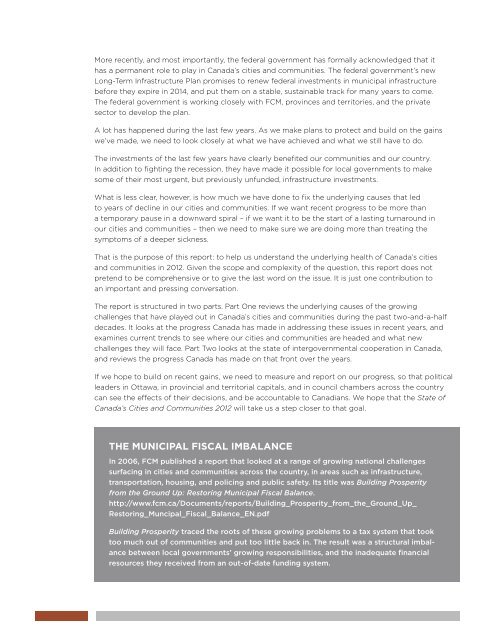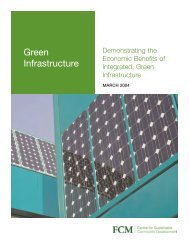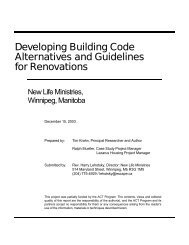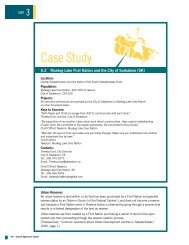The State of Canada's Cities and Communities 2012 - FCM
The State of Canada's Cities and Communities 2012 - FCM
The State of Canada's Cities and Communities 2012 - FCM
You also want an ePaper? Increase the reach of your titles
YUMPU automatically turns print PDFs into web optimized ePapers that Google loves.
More recently, <strong>and</strong> most importantly, the federal government has formally acknowledged that it<br />
has a permanent role to play in Canada’s cities <strong>and</strong> communities. <strong>The</strong> federal government’s new<br />
Long-Term Infrastructure Plan promises to renew federal investments in municipal infrastructure<br />
before they expire in 2014, <strong>and</strong> put them on a stable, sustainable track for many years to come.<br />
<strong>The</strong> federal government is working closely with <strong>FCM</strong>, provinces <strong>and</strong> territories, <strong>and</strong> the private<br />
sector to develop the plan.<br />
A lot has happened during the last few years. As we make plans to protect <strong>and</strong> build on the gains<br />
we’ve made, we need to look closely at what we have achieved <strong>and</strong> what we still have to do.<br />
<strong>The</strong> investments <strong>of</strong> the last few years have clearly benefited our communities <strong>and</strong> our country.<br />
In addition to fighting the recession, they have made it possible for local governments to make<br />
some <strong>of</strong> their most urgent, but previously unfunded, infrastructure investments.<br />
What is less clear, however, is how much we have done to fix the underlying causes that led<br />
to years <strong>of</strong> decline in our cities <strong>and</strong> communities. If we want recent progress to be more than<br />
a temporary pause in a downward spiral – if we want it to be the start <strong>of</strong> a lasting turnaround in<br />
our cities <strong>and</strong> communities – then we need to make sure we are doing more than treating the<br />
symptoms <strong>of</strong> a deeper sickness.<br />
That is the purpose <strong>of</strong> this report: to help us underst<strong>and</strong> the underlying health <strong>of</strong> Canada’s cities<br />
<strong>and</strong> communities in <strong>2012</strong>. Given the scope <strong>and</strong> complexity <strong>of</strong> the question, this report does not<br />
pretend to be comprehensive or to give the last word on the issue. It is just one contribution to<br />
an important <strong>and</strong> pressing conversation.<br />
<strong>The</strong> report is structured in two parts. Part One reviews the underlying causes <strong>of</strong> the growing<br />
challenges that have played out in Canada’s cities <strong>and</strong> communities during the past two-<strong>and</strong>-a-half<br />
decades. It looks at the progress Canada has made in addressing these issues in recent years, <strong>and</strong><br />
examines current trends to see where our cities <strong>and</strong> communities are headed <strong>and</strong> what new<br />
challenges they will face. Part Two looks at the state <strong>of</strong> intergovernmental cooperation in Canada,<br />
<strong>and</strong> reviews the progress Canada has made on that front over the years.<br />
If we hope to build on recent gains, we need to measure <strong>and</strong> report on our progress, so that political<br />
leaders in Ottawa, in provincial <strong>and</strong> territorial capitals, <strong>and</strong> in council chambers across the country<br />
can see the effects <strong>of</strong> their decisions, <strong>and</strong> be accountable to Canadians. We hope that the <strong>State</strong> <strong>of</strong><br />
Canada’s <strong>Cities</strong> <strong>and</strong> <strong>Communities</strong> <strong>2012</strong> will take us a step closer to that goal.<br />
THE MUNICIPAL FISCAL IMBALANCE<br />
In 2006, <strong>FCM</strong> published a report that looked at a range <strong>of</strong> growing national challenges<br />
surfacing in cities <strong>and</strong> communities across the country, in areas such as infrastructure,<br />
transportation, housing, <strong>and</strong> policing <strong>and</strong> public safety. Its title was Building Prosperity<br />
from the Ground Up: Restoring Municipal Fiscal Balance.<br />
http://www.fcm.ca/Documents/reports/Building_Prosperity_from_the_Ground_Up_<br />
Restoring_Muncipal_Fiscal_Balance_EN.pdf<br />
Building Prosperity traced the roots <strong>of</strong> these growing problems to a tax system that took<br />
too much out <strong>of</strong> communities <strong>and</strong> put too little back in. <strong>The</strong> result was a structural imbalance<br />
between local governments’ growing responsibilities, <strong>and</strong> the inadequate financial<br />
resources they received from an out-<strong>of</strong>-date funding system.

















